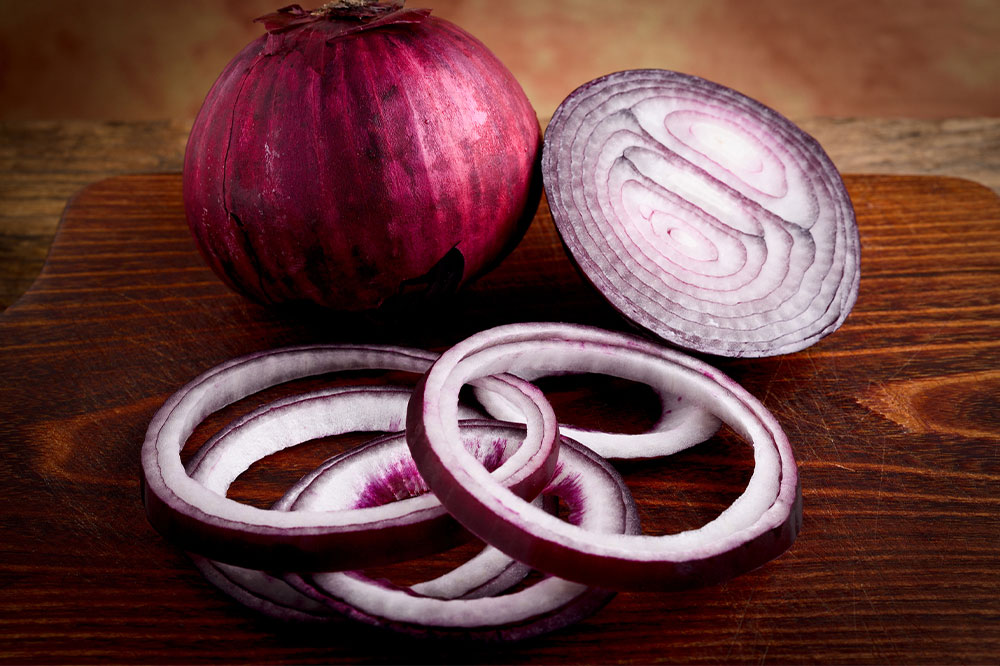Avoid these 8 foods that can trigger heartburn

Acid reflux, or heartburn, is a known symptom of common gastroesophageal reflux disease or GERD. The stomach contains digestive juices to break down foods and beverages. A separate muscle known as the lower esophageal sphincter prevents these juices from moving out of the stomach. Heartburn develops when stomach acid backs up into the esophagus, causing pain and irritation. It can be brought on by underlying health complications or the following trigger foods.
Allium vegetables
Onions, shallots, and garlic are all bulbous vegetables belonging to the allium family of plants. These vegetables are naturally high in fermentable fibers. Several studies suggest these fibers interact with the gut bacteria and trigger an increased production of stomach acid, which leaks into the esophageal cavity. Nutritionists suggest avoiding or limiting allium veggies to prevent acid reflux.
Citrus fruits
One should avoid citrus fruits when affected by GERD to prevent heartburn. Oranges, tomatoes, lemons, and limes are highly acidic in nature that disrupt the natural pH balance of the stomach acid. The digestive juices are forced to back up into the esophagus, causing heartburn and irritation.
Fatty food
Fats found in common foods and even some beverages take a while to digest. This results in the slow evacuation of foods from the stomach. Also, processed fats trigger the release of a hormone called cholecystokinin (CCK), which forces the lower esophageal sphincter to relax, allowing the stomach acids to back up. This is why nutritionists suggest avoiding processed fats, mainly trans and saturated fats. Most store-bought snacks, fried food, and confectionaries are rich in fats and additives. So one should avoid potato chips, fried snacks, ready-to-eat meals, and condiments like salad dressings.
Red meat
Those dealing with heartburn should also avoid or limit fatty cuts of deli meat like beef, lamb, and pork. Grilling, broiling, deep frying, or even searing these cuts of meats release compounds that trigger acid reflux. Also, most cuts of red meats are difficult to digest and sit longer in the stomach waiting to be processed, increasing the risk of stomach acids moving into the esophagus.
Sugary foods and drinks
Refined sugar is generously added to meals to make them taste better. However, these sugars are just empty calories that build up in the body and offer no nutritional value. Sugar does not directly trigger heartburn, but excessive sugar intake triggers a blood glucose imbalance, increasing the risk of diabetes. Lowering sugar intake can help prevent health complications that may trigger heartburn.
Spicy food
The sharpness in chili peppers and spices comes from a compound called capsaicin. This adds a kick to foods. However, studies reveal capsaicin also slows down digestion and increases the discomfort experienced during heartburn. So people with GERB or a similar condition should avoid spicy foods and condiments.
Caffeine and carbonated beverages
Caffeine helps stimulate metabolic activities in the body. It can also fight fatigue and tiredness for a short duration. However, beverages like coffee and tea can worsen acid reflux, as caffeine relaxes the LES allowing the acids to back up into the esophageal cavity. Also, the stimulant stirs up gastric fluids forcing the stomach to produce more digestive juices. One should also avoid chocolate, baked goods, and confectionaries that contain caffeine. Also, flavored sodas, artificial fruit juices, sparkling water, and other carbonated beverages actively react with the stomach acids. These drinks force bubbles to form in the acid forcing open the LES and allowing the gastric secretions to flow into the esophagus
Peppermint
Peppermint is added to candies, sweets, and certain meals and beverages. It has soothing properties and is often used as a lozenge for relieving throat irritation and pain. However, peppermint can also relax the LED, allowing stomach acids to reach the esophagus. So, avoiding peppermint or mint products can help one avoid heartburn.
Additional tips
Apart from avoiding certain foods, a few simple changes can also help manage heartburn symptoms. Here are some tips:
- One should have smaller meals to meet their daily nutrient requirements.
- People with acid reflux problems should avoid heavy meals before bedtime, as sleeping on a heavy stomach significantly slows digestion.
- To prevent heartburn induced by rigorous physical activity, one should have plenty of water before, during, and after exercise.